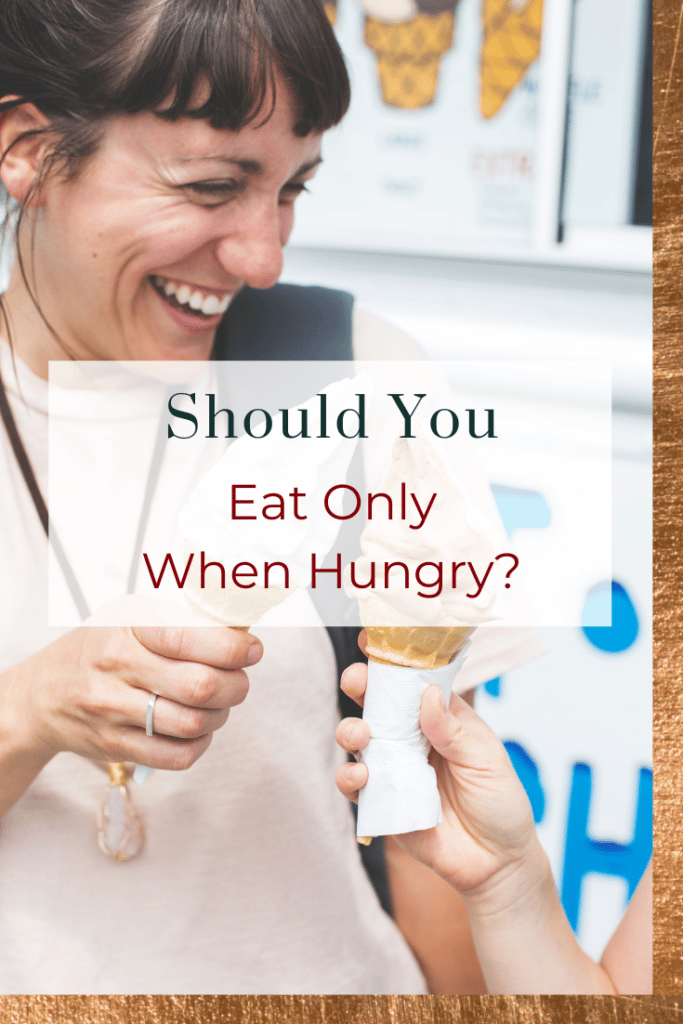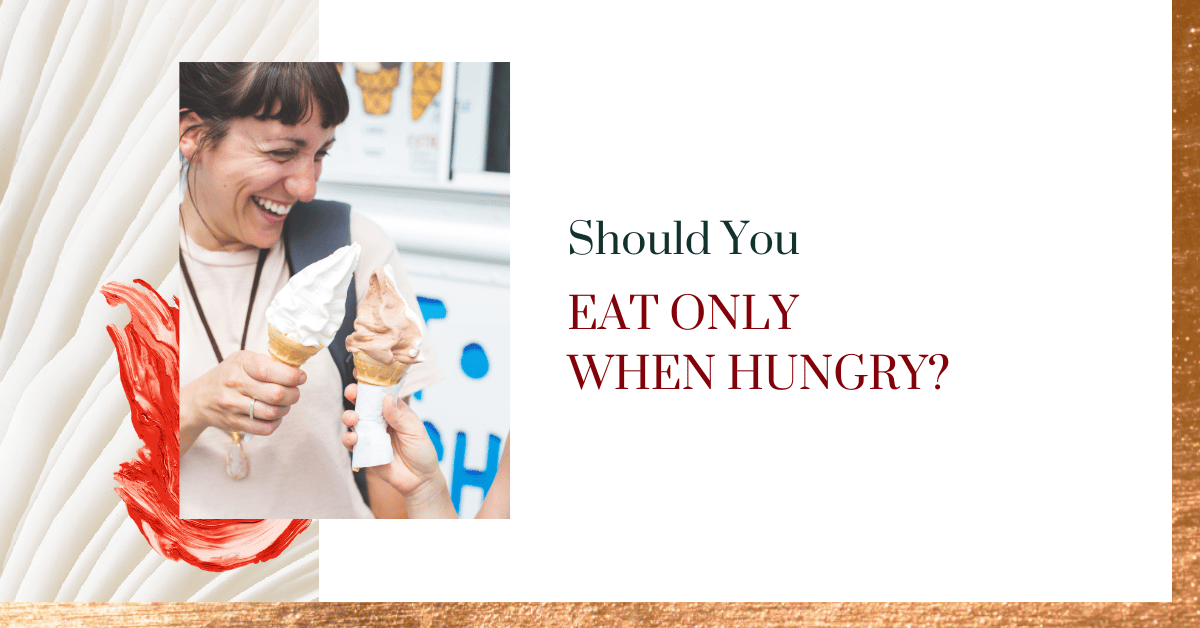Table of Contents
One of the common questions people have as they begin their intuitive eating journey and become more attuned to their hunger cues is whether they should eat only when they are hungry. (Spoiler alert: the answer is no!).
Continue reading to understand why there are many reasons you might eat, aside from just hunger, and why this is not just okay – it’s normal.

What are the messages you’ve received about eating only when hungry?
Most of us have received messages that tell us that we need to differentiate between eating for hunger and eating for boredom, or other emotions. The latter is commonly chastised as an “invalid” reason for eating.
Diet culture has taught that “healthy eating” means “only eat when you’re hungry”. This is also a message that can inadvertently come through when people are learning about intuitive eating.
In response to a craving or desire to eat, you might have been told – via a diet plan, a health professional, or even a dietitian – that you should:
- “Wait 20 minutes to see if you’re actually hungry.”
- “Eat something else (usually something like an apple or a carrot) and see if you’re still craving the food.”
- “Find something else to do if you’re bored to distract yourself.”
When I was first practicing as a dietitian, I used to recommend many of these same things to my patients and clients.
But over the years I’ve come to realize that this line of thinking – that we MUST be physically hungry in order to eat anything – is unhelpful at best and harmful at worst. It tends to put us in a restrictive mindset, which often leads to later bingeing. This brings us to…
Is it okay to eat when not hungry?
Absolutely! Food serves many purposes aside from just being a source of fuel and nutrients. There are many reasons why you might want to eat, even when you are not physically hungry.
Food is a source of joy, pleasure, culture, and memory.
In many cultures, food is a language of love, connecting family members, friends, and even generations. Can you think of a dish that makes you happier when you’re having a rough day? Or a dish that you associate with a family member or memory? For me, it’s chocolate chip cookies that I used to make with my mom and boxed macaroni and cheese that always provides comfort.
Food also reflects history and culture and is a bond that connects people and places. The way a dish is historically made can tell you about the socio-agricultural history of its place of origin.
Food can be a coping mechanism.
Sometimes food may be the only thing that can calm us down or comfort us when we’re stressed, sad, or lonely. In these situations, we’re relying on food as a coping mechanism, and that’s okay.
Coping mechanisms develop for a reason, in order to help us through a tough time. It’s not helpful to deprive yourself of that coping tool (i.e. food), especially if you don’t have other ways to cope with that stressor or emotion.
Intuitive eating also involves brain knowledge.
Intuitive eating involves using your body cues and your brain knowledge to decide what, when, and how much to eat.
For example, your work schedule might mean that your only chance to eat is early in the morning before work; otherwise, you won’t have a chance to eat until midday. Although you may not feel hungry that early in the morning, it’s still important that you eat something to provide your body with energy and to prevent getting overly hungry midday.
There are also times when your hunger cues may be masked by stress, anxiety, caffeine intake, and even exercise. Many people don’t feel hungry when they’re busy, stressed, anxious, have just worked out, or have consumed a lot of caffeine.
But just because you don’t feel hunger cues at those times, doesn’t mean you don’t need to eat: your body still needs energy and fuel. This is where your brain knowledge comes in, to alert you that it’s been X hours since you’ve last eaten, or remind you that you still need to eat even if you don’t feel hungry.
What about ultra-processed foods?
You might have heard or read about” ultra-processed foods”, how they are engineered to be hyper-palatable or super tasty, and how they’re marketed to be highly appealing.
It may seem like these foods are out to “hijack” our body’s inner hunger-fullness system, but to our body, these are still just foods that have flavors and textures and provide some combination of nutrients.
Try to approach these foods the same way you would approach any other foods: be mindful and pay attention to your body as you eat them. What do you notice taste-wise, flavor-wise, satisfaction-wise, fullness-wise?
You may notice once you start eating that the food may not taste as good in the moment, even though it seems really appealing before. This could be because the branding or marketing of the food makes it appealing, but it is not actually what your body wants at the moment.
There is a difference between “forcing” yourself to not eat ultra-processed foods (which can trigger the restrict-binge cycle) and compassionately giving yourself permission to eat them, while noticing how they affect you.
Sometimes ultra-processed or packaged foods seem highly appealing because we have labeled them “bad,” and we think of them as something we shouldn’t be eating. This type of mental restriction puts us in a mindset of scarcity.
This mindset can drive us to eat more and feel like we “lose control” when we get access to the restricted or off-limits food. As you work to give yourself unconditional permission to eat, you might notice that this appeal wanes over time, and eventually, these ultra-processed foods will just feel like any other food to you.
What are some reasons to eat besides hunger?
Below are some situations why you may want to eat even when you’re not physically feeling hunger cues. Do you relate to any of them?
- When you are physically full, but not mentally satisfied with what you already ate.
- When you have a food craving.
- When you’ve just worked out.
- When you see someone else eating, and their food (and their eating experience) looks really appealing.
- When eating is part of an experience (for example, popcorn at the movies or cake at a birthday party).
- When you notice that you’re stressed or anxious, and haven’t eaten in the past 3-4 hours.
- When you are trying a food for the first time (for example, while traveling in a new city, or visiting a new restaurant).
- When a food has a special meaning to you (for example, a certain food that you always eat on a special occasion, or when visiting your parents).
- When you know you’re going somewhere where you won’t be able to eat for several hours.
- When you are stressed, and feel like a certain food would help you feel safe or calm you down.
- When the food seems really tasty at the moment!
Do you have other motivations to eat aside from hunger? Comment them below!
Some things to keep in mind about hunger and eating
Remember that ideally, you want to try to eat every time you are hungry, not just only when you’re hungry!
Regardless of the situation, the motivation, or the food, can you be present to everything you are experiencing, without overly worrying about what or why, or how much you’re eating?
If discomfort arises as you give yourself permission to eat outside of hunger, sit with that discomfort. Explore where it might be coming from. This can be a great opportunity to better understand your relationship with food. A dietitian who specializes in intuitive eating can also be supportive.
Looking for more support?
My team and I offer virtual one-on-one coaching and can help you get out of the all-or-nothing mindset, find the gray area, and make peace with food and your body – check out our nutrition coaching packages to learn more.
You can also check out my Unapologetic Eating 101 Course, an online, self-paced intuitive eating and body image program to liberate yourself from dieting and make peace with food and your body.
Author Bio
This blog post was written and compiled by Thanh Thanh Nguyen, a dietetic intern at Teachers College, Columbia University.
The post was edited and reviewed by Alissa Rumsey, MS, RD, CSCS, a registered dietitian and Certified Intuitive Eating Counselor. She specializes in weight-inclusive care, intuitive eating, body image healing, mindfulness, self-compassion, and healing from chronic dieting, disordered eating, and eating disorders. Alissa holds a Bachelor’s Degree in Nutrition and Exercise Science, and a Master’s Degree in Health Communications, and is also an NSCA Certified Strength and Conditioning Specialist.


More Stories
United Healthcare’s ransomware attack shows why supply chains are under siege
Nutrition Tips For Ramadan | JM Nutrition
Probiotics for IBS | The Nutritionist Reviews